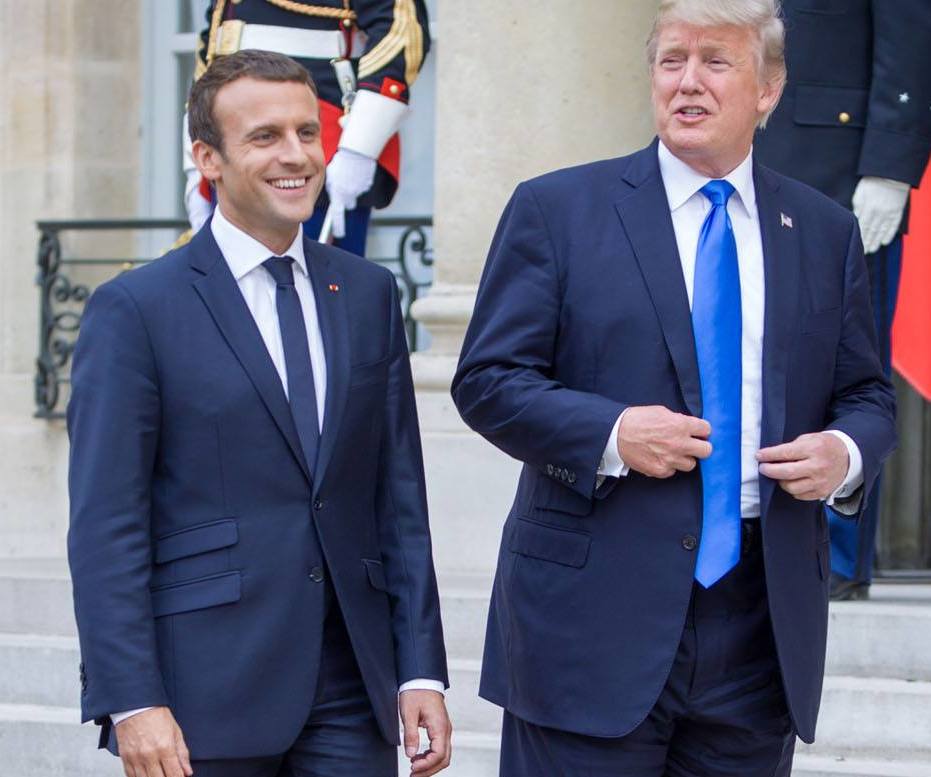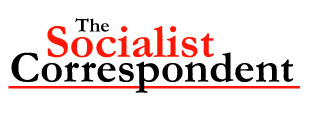France further to the right under Macron
this article is also available as a podcast. Click on the link at the end of the article to listen.
By Simon Korner
President Macron is driving through the most hard-hitting anti-worker measures in France since the war. The reforms not only consolidate the controversial El Khomri labour reforms brought in by decree under his predecessor Hollande, but roll back decades of other protective legislation. Also targeted in the longer term is the centralized system of public services and ‘fonctionnaires’ (public sector workers) established in 1945 as a concession to the power of the Communist-led Left after the war.
With the highest public expenditure in the world as a percentage of GDP, France cannot compete with lower wage rivals in the EU, particularly Germany and the UK. Macron’s budget cuts of €50 billion will give France a better chance in the race to the bottom.
In line with Germany’s insistence on tight finances, Macron plans to shrink France’s deficit to 2.6% of GDP in 2018, below the 3% limit set out in the Maastricht Treaty. The method is to follow the UK in creating a workforce with fewer rights and stripped back welfare, driving down wages across the board. A shrunken public sector will go hand in hand with increased privatization. The government has stakes worth around €100bn in 81 companies, and Macron so far plans to privatize around a tenth of these.
“FLEXICURITY”
French Labour Minister, Muriel Pénicaud, a former boss of Danone, believes the current Labour Code is a shackle that constrains French companies. Macron justifies its removal by citing “flexicurity” – the Danish model that claims to offset reduced job security by providing training for a flexible jobs market underpinned by state benefits. He also believes his measures will shrink France’s high unemployment rate of 9.5% (25% youth unemployment), more than double that of the UK and Germany. In reality, as in the UK, in-work poverty will simply grow.
Macron’s draconian measures will destroy national collective bargaining by allowing smaller companies – the vast majority of French business – to foist agreements on individual workers regarding working hours and pay, outside union negotiations. The atomization will weaken employment rights. At the same time, union representation on company committees is being significantly weakened, with budget cuts to the works councils which negotiate with management and reduction in their influence through their merging with health and safety committees into single “social and economic committees”.
Other reforms include capping damages for unfair dismissal at 20 months salary for those with the longest service, and limiting the time for any appeals to a year.
The measures will effectively scrap permanent employment contracts by limiting their duration to particular projects – following the short-term contracts in the construction industry.
They will also scrap the law preventing foreign companies from firing French workers when a company performs badly at national level (even if, for instance, a multinational company is profitable internationally). Some of the first victims will be the soon-to-be sacked workers at PSA Peugeot-Citroën, accelerating the deindustrialization of France, which has lost a quarter of its manufacturing workforce since 2000. From now on multinationals will have far more room for movement when they want to relocate to lower wage economies.
Macron claims the reforms will not lead to the precarious McJobs of Germany and Britain, because France will retain its minimum wage and spend €15 billion on training workers for the new flexible jobs market, along with an “activity bonus” equivalent to a 13th month of salary for the lowest paid workers. But with union influence severely curtailed, minimum wage jobs will proliferate and there will be no oversight to ensure it is actually paid. British workers have bitter experience in this respect.
9 MILLION BELOW THE POVERTY LINE
Other means of transferring wealth from poor to rich are:
- a rise in charges on pensions, known as the Contribution Sociale Généralisée (CSG), a non-progressive tax;
- a reduction in health cover provided by the Sécurité Sociale (Secu);
- the weeding out of unemployment claimants to ensure targets are hit has already cut numbers by 14%. Those crossed off (for failing to attend an appointment, or refusing a ‘reasonable’ job offer) the list lose all income for 6-12 months;
- the threat of massive public sector job cuts – 120,000 out of 5.4 million;
- the abolition of the ISF wealth tax, with capital investment exempted from taxation, and a lowering of the tax on dividends to a flat rate of 30%. The estimated cost of all the tax cuts planned will be more than €7 billion.
According to the Catholic Aid (Secours Catholique) charity, 9 million people are living below the poverty line (of just over €1,000 per month), with average incomes of those helped by the charity of just €548.
To reinforce the government’s position, the recently expired state of emergency – brought in after the Paris terror attacks – has been replaced by a permanent anti-terror law that covers much of the same ground, allowing the dismissal of public-sector workers whose beliefs the government declares to be “incompatible” with their duties, as well as searches of private homes or any area declared a “security zone”, mass surveillance, house arrest and electronic tagging.
Having announced his plans before the elections, Macron has acted quickly, signing the new decrees in late September 2017 live on TV and boasting that the changes were “unprecedented” and had been passed in record time for such a major reform. “We tackled the hardest, symbolic part, the labour code and the taxation of capital, first,” said a presidential spokesperson. “The same actors had been playing out the same drama for decades. We got the theatrical part over.”
RESISTANCE
There has been working-class resistance to the measures. The CGT union – once Communist-aligned but nowadays more politically diffuse – has organized strikes and protests at roughly monthly intervals since September 2017, fairly massive at first, but insufficient to halt the government’s measures. Other unions have kept their distance, with the Force Ouvrière (FO) federation – created originally as an anti-Communist rival to the CGT – only calling on its members to join the protests in November, and the CFDT (which supported Hollande’s Parti Socialiste) more muted still. CGT leader Philippe Martinez promised to continue the fight, but the protests have been smaller than those in March 2016 against Hollande’s reforms, and Martinez sees union disunity as a cause. The unions are suffering from reduced membership – now down to 8% of the French workforce, the lowest in western Europe, and the new reductions to workplace representation and paid time for union officials will further weaken them. In spite of their small numbers, union deals cover 90% of French employees, and it is this influence that Macron is out to destroy.
Mélenchon’s France Insoumise movement – he eschews the word ‘party’ – with 12-14% of the national vote at the last election has organized demonstrations separately, adding to the disunity on the Left. Mélenchon refuses to consider any alliances – for instance, with the reformist Communist Party – and has banned red flags from his rallies, and stopping singing the Internationale at the end of each public meeting, replacing them with tricolour flags and La Marseillaise. With over 500,000 internet users registered on his movement’s website he claims a mass base, but his decision to cap local groups at 12 members, and to ban co-ordination locally or regionally, has effectively demobilized people, concentrating power in his own hands. Mélenchon calls this ‘transversal’ rather than vertical organisation – based on the ideas of Chantal Mouffe and Ernesto Laclau – but his abandoning of traditional Left structures and positions has failed to broaden his appeal. There are stirrings of resistance against the rightward drift in the French Communist Party, both from within (eg. Faire Vivre et Renforcer le PCF) and from outside the party (eg le Pôle de Renaissance Communiste en France) – but these have yet to materialize in any sizeable way.
As for the Parti Socialiste, having suffered a historically disastrous election defeat under Benoit Hamon who has since resigned, it may never recover. Francois Hollande is the first president of the 5th Republic not to have stood for a second term.
FAR RIGHT
Meanwhile on the Right, the victory of Laurent Wauquiez to lead The Republicans (LR) following Fillon's election defeat, moves the conservative, Gaullist party to the far right, echoing Sarkozy's tactics of adopting much of the Front National's (FN) programme. Wauquiez is supported by ex-FN members such as Guillaume Peltier, whose grouping in the LR was founded by the far right. Wauquiez has publically attacked Muslims and gay marriage.
The FN, meanwhile, are calling for the two parties to work together. FN leader Marine Le Pen told Wauquiez in November to ally with the FN: “Mr Wauquiez cannot sincerely say the same things that we do, and sometimes with words that are even cruder than ours, and at the same time explain that we must be held apart from French political life.”
So far, Wauquiez has refused, partly to appease the pro-Macron wing in his party, the Constructive Opposition, and partly because the FN would overwhelm the feeble LR in any alliance. In spite of disappointing electoral results, which saw the FN’s 10.6 million votes in the presidential election fall to less than 3 million in the legislative elections, the FN clearly represents the main opposition from the Right.
But the FN itself is divided, with the more working-class north tending to socialist-type positions, and the patriotic anti-immigrant south more conservative. Further divisions over the EU have emerged, with allies of anti-EU Florian Philippot pitted against those who want to win over rightwing voters from the LR and believe the EU is a divisive issue. Marion Maréchal-Le Pen, who embodied the latter approach, has for the moment stood down, leaving Marine Le Pen to keep the two wings together.
France is entering a phase of intensified capitalist class offensive. The current disunity on the Left points to a rightwing rather than a leftwing popular response to the onslaught – but the Left has not disappeared by any means, and the structures still exist through which resistance could be channeled, should a more militant class-conscious leadership emerge.

Best pals: President Macron and President Trump
"the estimated cost of all Macron's planned tax cuts will be more than 7 billion Euros.
According to the Catholic Aid (Secours Catholique) charity, 9 million people are living below the poverty line (of just over 1,000 euros per month, with average incomes of those helped by the charity of just 548 Euros."







